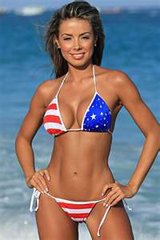
THE TIM TEBOW FACTOR IN DENVER by The Gold Sheet’s, Bruce Marshall

Not that players, coaches, and owners haven’t occasionally become lightning rods in the past. Often, it’s unusual or criminal-type behavior that encourages the extreme emotions involved in the Tebow debate. But, for what it’s worth, the ex-Gator is about as far from the punk element as any pro football player we can recall. A cleaner-liver among NFL players you’d be hard-pressed to find.
The rules are different for the Tebow discussion, however, because they have become indirectly laced with socio-political angles that have aligned themselves with the pro and anti-Tebow factions. Never mind the sports pages or sports websites. Anyone who doesn’t think that the Tebow debate has become politically charged should tune into one of the news talk shows on TV or radio the day after a Broncos game.
We are particularly humored by “The Five” on Fox News, where the pro and anti-Tebow elements have predictably lined up along political lines, with Bob Beckel playing the skeptic while Dana Perino (a Colorado girl) and Eric Bolling spout the pro-Tebow rhetoric. Using that example as a guide, you can probably figure out on which side of the political aisle the pro and anti-Tebow elements seem to sit.
Hardly do we recall any athlete prompting such discussion in normally non-sports related programming. Indeed, Tim Tebow talk seems to be everywhere these days.
 We suspect, however, that it’s the anti-Tebow elements of the media that have been more responsible for ratcheting-up the rhetoric. We run into lots of football people in our travels through the country and in Las Vegas, and have seen our fair share of the pro-Tebow crowd, but hardly sense the sort of delusion with which they have been labeled by the anti-Tebow elements, many of whom seeming intent on stereotyping the Tebow-loving crowd along political and societal lines.
We suspect, however, that it’s the anti-Tebow elements of the media that have been more responsible for ratcheting-up the rhetoric. We run into lots of football people in our travels through the country and in Las Vegas, and have seen our fair share of the pro-Tebow crowd, but hardly sense the sort of delusion with which they have been labeled by the anti-Tebow elements, many of whom seeming intent on stereotyping the Tebow-loving crowd along political and societal lines.
One such story was run recently on ESPN’s website by Howard Bryant, entitled “Cult Classic,” which made the typical and thinly-veiled suggestions of race, religion, and politics as angles that have distorted the Tebow debate in the face of evidence that, well, Tebow just isn’t a very good quarterback.
We’ve seen the same types of anti-Tebow stories by different writers and commentators for a long while, and sorts such as Bryant have a right to align themselves with the Tebow disbelievers if they wish.
We have to wonder, however, why societal elements often seem to drip into these types of evaluations from the anti-Tebow crowd. And sorts such as Bryant, whose mention of “meritocracy” and other hot-button topics, continue to perpetuate those divisions.
For the record, Bryant is an author of some repute, having penned The Last Hero, The Life of Henry Aaron, although we have long wondered where the “meritocracy” argument that Bryant so loves to expound might apply to his own career that has been safeguarded by the new societal norms reflected by ESPN. This is a writer who, in his Aaron book, seemed more interested in describing Joe Torre’s long-ago carousing than evaluating Aaron as a player by asking contemporaries such as Red Schoendienst (never referenced in the book), Frank Robinson, or Bob Gibson what they thought of Hammerin’ Hank. Instead of using primary sources and interviewing those who played with or against Aaron, or referencing their written memoirs, Bryant appeared to base his research upon old newspapers from the era, which should be considered secondary sources at best, with copy mostly produced by writers on tight deadlines. And if Roger Kahn, in the classic The Boys of Summer, could have made the time to seek out and reference an interview of the Milwaukee Braves’ five-time all-star OF Andy Pafko and make him a key source for his outstanding book, why couldn’t Bryant have done the same? Bryant also took several cheap shots at Willie Mays (a new biography of Mays shows he did more than his share of charitable work off the field) and dwells forever on how Aaron should have been called “Henry” instead of “Hank.”
Like many of the new politically-correct generation, Bryant probably has no idea that Aaron has been a Baby Boomer hero to all colors of people since the early seventies. It can be argued that Bryant’s career has greatly benefited from America’s guilt over past civil rights battles, yet he seems intent on re-opening those wounds whenever possible.
The same sorts of stereotypes to which Bryant often refers are laced, though a bit more obliquely, into his recent Tebow commentary.
 Bryant’s Tebow story didn’t completely miss the mark, noting the roles an improving Bronco defense (in particular rookie LB Von Miller, whose vast contributions have been too much for even Bryant to ignore) and ground game have played in Denver’s recent resurgence. But the piece was mostly off base, if not wildly so, especially when suggesting the Broncos’ new-found and omnipotent infantry diversion somehow emerged without help from Tebow. That alone should disqualify the Bryant story from serious fooball-related discussions.
Bryant’s Tebow story didn’t completely miss the mark, noting the roles an improving Bronco defense (in particular rookie LB Von Miller, whose vast contributions have been too much for even Bryant to ignore) and ground game have played in Denver’s recent resurgence. But the piece was mostly off base, if not wildly so, especially when suggesting the Broncos’ new-found and omnipotent infantry diversion somehow emerged without help from Tebow. That alone should disqualify the Bryant story from serious fooball-related discussions.
We’re aware that Tebow inadvertently pushes the wrong buttons for a certain sector of society which is reflected within many of the major media outlets. That the Tebow debate has become politically-charged is an unfortunate byproduct of a society in which sports are apparently no longer immune.
But in reference to Howard Bryant’s “meritocracy” argument, we fail to see where Tebow has somehow fun afoul. Tebow wasn’t just another successful college quarterback; it could be argued he was among the most successful in college football history. Further confirmation should come from those who have watched the Florida Gators descend to mediocre status soon after his departure. And the win-loss results of Tebow’s early NFL work in Denver, now 6-1 this season after Sunday’s win at Minnesota, have been unfailingly positive.
 Moreover, we suggest that sorts such as Bryant and other Tebow bashers are missing the point on the ex-Gator entirely while they waste space trying to apply political and social steroetypes to the pro-and-con arguments. And why do so many sportswriters and fans become infatuated by glittering passing stats, anyway? We have always thought a very-underappreciated stat might be avoiding sacks, and how Tebow (also basically turnover-free, with only one giveaway in a recent 300-plus snap span over five games) rarely causes negative passing plays by getting dumped in the pocket. Consistent 8-to-12-yard losses are a killer for offenses, and Tebow’s play seems to preclude that development, giving his team more makeable third and even fourth-down plays, not to mention pacing the game to the point where Tebow’s playmaking skills can be showcased with the result on the line in the late going.
Moreover, we suggest that sorts such as Bryant and other Tebow bashers are missing the point on the ex-Gator entirely while they waste space trying to apply political and social steroetypes to the pro-and-con arguments. And why do so many sportswriters and fans become infatuated by glittering passing stats, anyway? We have always thought a very-underappreciated stat might be avoiding sacks, and how Tebow (also basically turnover-free, with only one giveaway in a recent 300-plus snap span over five games) rarely causes negative passing plays by getting dumped in the pocket. Consistent 8-to-12-yard losses are a killer for offenses, and Tebow’s play seems to preclude that development, giving his team more makeable third and even fourth-down plays, not to mention pacing the game to the point where Tebow’s playmaking skills can be showcased with the result on the line in the late going.
The object of football remains to score and prevent the other team from scoring, and Tebow’s presence, in a non-traditional way, seems to be an important plus factor in those dynamics . We suggest Tebow’s value, both at Florida and, to a certain extent, at least, with Denver, climbs appreciably because he rarely commits turnovers or gets sacked, and can extend drives by making short first-down runs that other QBs cannot. Although we are still waiting for the proper stat-driven gridiron plus/minus example that would confirm our read on the Tebow factor.






